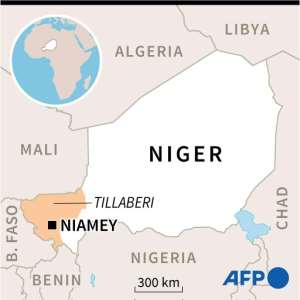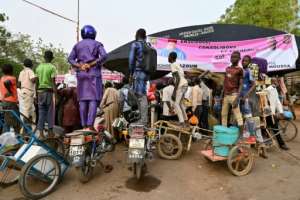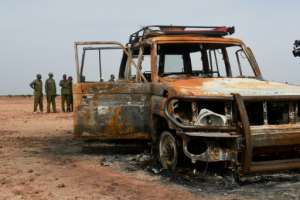
[ad_1]
Niger will choose between two heavyweights in the second round of the presidential poll on Sunday, which is expected to trigger the first democratic transition of power in the history of the coup-prone country.
Niger is the poorest nation in the world, according to the UN development benchmark of 189 countries, and grapples with jihadist insurgencies that have spread from Mali and Nigeria.
Despite these crushing burdens, the country is on track for a peaceful handover of power between elected presidents, its first since independence from France in 1960.
 Niger. By (AFP)
Niger. By (AFP) Outgoing President Mahamadou Issoufou’s decision to voluntarily step down after two five-year terms has been welcomed in a region where many leaders have tried to cling to power.
“Handing over power in 2021 to a democratically elected successor … will be my greatest achievement,” Issoufou said.
His successor will be either his right-hand man and anointed successor Mohamed Bazoum, or Mahamane Ousmane, who became the country’s first democratically elected president in 1993, only to be overthrown in a coup three years later.
Ousmane, 71, is running for president for the fifth time since his ouster.
Veterans
Both candidates are mainstays of the Nigerien political scene, where only a few men have scrambled for power over the past decade, forging alliances and breaking them just as quickly.
Winning votes alone has not always led to power in Niger – there have been four military coups and six elections since independence.
But political alliances will occupy an important place on Sunday, when Bazoum will be the big favorite after winning 39.3% of the vote in the first round on December 27.
 Bike boost: supporters stand on their motorcycles for a better view during a campaign rally in Bazoum. By Issouf SANOGO (AFP)
Bike boost: supporters stand on their motorcycles for a better view during a campaign rally in Bazoum. By Issouf SANOGO (AFP) The 60-year-old former interior minister has already sealed the support of the candidates who came third and fourth in the first round.
“Bazoum has a coalition that should win if the voting instructions of the parties that support him are followed by their activists,” said Ibrahim Yahya Ibrahim of the International Crisis Group (ICG) think tank.
But, he warned, it was “very far from won.”
Ousmane took nearly 17 percent in the first round.
He can count on the support of a coalition of 18 opposition parties called Cap 20-21 as well as on Hama Amadou, who was previously considered the most formidable candidate against Bazoum.
Amadou was excluded from his candidacy due to a prison sentence for trafficking in babies which he criticized as being politically motivated.
The opposition appealed unsuccessfully against the result of the first round, alleging fraud.
A diplomatic source, speaking on condition of anonymity, said the concern was not so much about “unfair practices” as the ruling party’s massive electoral machine.
The elections “are not perfect, at least they are elections,” the source said.
Vast challenges
Bazoum campaigned on continuity with the previous regime, which promised development in a country struggling with the world’s highest birth rate – an average of seven children per woman.
“To absorb this population growth, it would take incredible economic growth,” a Western diplomatic source said.
Only 7.4 million of the country’s 22 million people are eligible to vote on Sunday – the rest are minors.
 Six French aid workers, their local guide and the driver were killed by jihadists in the Koure nature reserve near Niamey last August. By Boureima HAMA (AFP)
Six French aid workers, their local guide and the driver were killed by jihadists in the Koure nature reserve near Niamey last August. By Boureima HAMA (AFP) A huge security challenge also awaits the winner.
A brutal jihadist insurgency is escalating in the west of the country, while Islamist militants from the Nigerian Boko Haram movement carry out relentless attacks in the south-east of the country.
Like its neighbors in the Sahel, Mali and Burkina Faso, Niger is finding it increasingly difficult to cope.
Hundreds of soldiers have been killed and hundreds of thousands of people have fled their homes.
A senior defense ministry official told AFP that thousands of security forces were deployed to protect polling day, “especially in areas prone to insecurity,” as Niger’s borders will be closed for 24 hours.
Polling stations will be open from 8 a.m. to 7 p.m. (7 a.m. to 6 p.m. GMT).
Source link